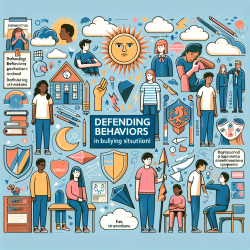Introduction
In the realm of speech-language pathology and online therapy, data-driven decisions are pivotal in crafting effective interventions. The research article titled "Menthol cigarette use in substance use disorder treatment before and after implementation of a county-wide flavoured tobacco ban" offers insights that can be translated into the field of online therapy, particularly for children. While the study focuses on substance use disorder (SUD) treatment, its implications on behavioral change and policy impact provide valuable lessons for practitioners in other domains, including online therapy services like those offered by TinyEYE.
Understanding the Research
The study conducted by Guydish et al. (2021) examined the impact of a San Francisco City and County ban on flavored tobacco products, including menthol cigarettes, among clients in residential SUD treatment. The research involved cross-sectional surveys before and after the ban, assessing demographic characteristics, smoking status, and behaviors. Notably, the study found no significant decrease in cigarette consumption or increased readiness to quit among smokers post-ban, although there was a reduction in menthol cigarette usage.
Translating Findings to Online Therapy
While the study's primary focus is on tobacco use, the underlying principles of behavioral change and policy impact can be applied to online therapy for children. Here are some key takeaways for practitioners:
- Behavioral Change is Complex: Just as the ban did not significantly reduce smoking rates, changing behaviors in therapy requires more than one intervention. Practitioners should employ a multifaceted approach, combining different strategies to address the unique needs of each child.
- Importance of Compliance: The study highlighted the need for broader bans to achieve significant behavioral change. Similarly, consistent and comprehensive implementation of therapy plans is crucial for achieving desired outcomes in online therapy.
- Data-Driven Adjustments: The research underscores the importance of data in evaluating the effectiveness of interventions. Online therapists should regularly assess and adjust therapy plans based on data and feedback to ensure they meet the evolving needs of children.
Encouraging Further Research
The study by Guydish et al. (2021) opens avenues for further research, particularly in understanding how policy changes impact behavior in various contexts. Online therapy practitioners are encouraged to explore how similar principles can be applied to enhance therapy outcomes for children. Conducting research on the efficacy of different therapy techniques and their impact on child development can lead to more effective and tailored interventions.
Conclusion
The intersection of research and practice is where innovation thrives. By leveraging insights from studies like the one on menthol cigarette use, online therapy practitioners can enhance their skills and create more impactful interventions for children. As we continue to explore the vast potential of online therapy, let us remain committed to data-driven decisions and the pursuit of knowledge that empowers positive change.
To read the original research paper, please follow this link: Menthol cigarette use in substance use disorder treatment before and after implementation of a county-wide flavoured tobacco ban.










